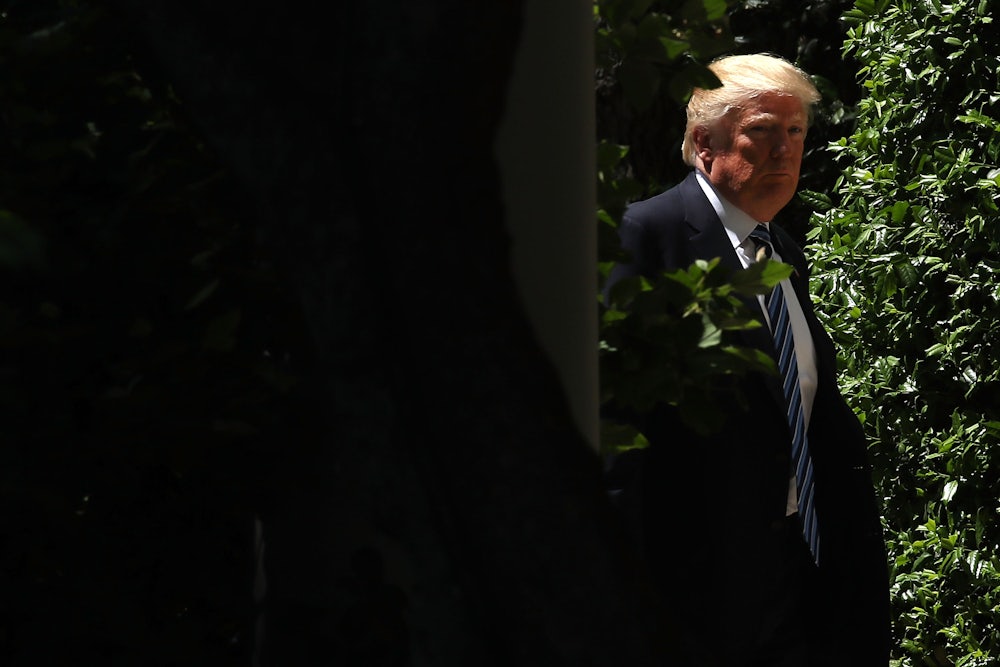When Donald Tump ran for president, and in the weeks after winning the election, his critics justifiably worried about his autocratic tendencies. This man, after all, had egged on his followers to assault protesters, called for his political opponent to be jailed, attacked the independence of the judiciary, and repeatedly expressed an unwholesome admiration for tyrants like Saddam Hussein and Vladimir Putin. As president, Trump has continued to show worrisome anti-democratic instincts, as in his continued lambasting of the judiciary and calls for changes in libel laws to curtain freedom of the press. On Tuesday night, Trump tweeted criticism of his FBI director, James Comey, an especially unwise move given that Comey is investigating possible collusion between the Trump campaign and the Russian government last year. By bashing a government official who is supposed to be independent, Trump confirmed fears that he’s an authoritarian at heart.
Yet, can this account of Trump as a would-be strongman be reconciled with the fact that the president is also showing himself to be inept at using the awesome powers of the presidency? Trump’s legislative agenda has stalled and his major executive orders have been either overturned in court or made little impact, serving more as political theater than meaningful policy shifts. If Trump really were an authoritarian, wouldn’t he have an easier time getting things done, even in the face of the constitutional system of checks and balances? That’s the question the political scientist Corey Robin asked Tuesday in the Guardian, where he suggested that it would be better to look at Trump’s actions rather than his words.
“If Trump were actually serious about consolidating his power, he might start by, oh, I don’t know, consolidating his power,” Robin wrote, noting that Trump hasn’t filled 85 percent of senior-level executive positions. “It’s a strange kind of authoritarian who fails, as the first order of business, to seize control of the state apparatus: not because there’s been pushback from the Senate but because, in most instances, he hasn’t even tried.”
Robin’s argument that there is a disjunction between Trump’s (aggressive and bullying) words and his (often ineffectual) actions was echoed in a kinder form by Arizona Senator John McCain. Speaking Tuesday on MSNBC’s Morning Joe, McCain said Trump’s praise of foreign strongmen like Philippines President Rodrigo Duterte is “very disturbing.” But McCain added that “when the president does his job, such as the cruise missile strike, such as selecting a national security team that is the strongest I’ve seen, such as many of the actual actions he’s taken, I have been strongly supportive. And I will continue.” Trump’s reasonable actions, in McCain’s judgement, deserve to be separated from Trump’s “statements and comments [that] fly in the face of everything I’ve believed in my whole life.”
Although coming from very different political positions, both Robin and McCain are making a distinction between words and deeds, arguing that Trump’s policy impact is ultimately more important than his words. There is much to recommend to this position when dealing with a figure like Trump, who uses language wildly and irresponsibly, without necessarily intending to act on his words.
Yet, this distinction ultimately fails to convince. The president is the head of state, and hence his words will invariably have a real-world impact, whether or not they lead to formal laws or policies. By praising Duterte for “fighting very hard to rid [his] country of drugs,” Trump is reversing the Obama administration’s treatment of Duterte as diplomatically beyond the pale. Consider the impact this sea-change has on politics in the Philippines. This will both legitimize Duterte and make it harder for his opposition to oust him, since they can no longer claim that he’s hurting their country’s relationship with the United States. “By essentially endorsing Duterte’s murderous war on drugs, Trump is now morally complicit in future killings,” John Sifton of Human Rights Watch told The New York Times.
The same principle, that a president’s words carry weight, also applies to Trump’s attacks on judges and on Comey. These words have a chilling effect. The fact that their direct impact can’t be measured makes them scarier, since we can never know if judges or law enforcement officials pull their punches for fear of angering the president. With words alone, Trump is delegitimizing the very institutions that are tasked with holding him accountable.
The whole question of whether Trump is an authoritarian or incompetent president rests on a false choice. Authoritarian regimes are usually inefficient and corrupt, driven by the very inability to achieve goals through normal legal means. No doubt Trump’s ignorance, laziness, and lack of experience are limiting his ability to achieve many of his goals, but they are also fueling his impulse to act capriciously and with no regard for the rules. While his presidency thus far may be incompetent in its execution, it’s authoritarian in its aspirations. And that, ultimately, is why Trump’s horrifying words can’t be dissociated from his deeds: They’re united by his deep scorn for the normal functioning of American democracy.
